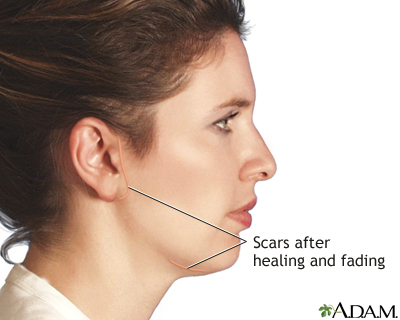Health Library
Facelift - series

Indications
Sagging or wrinkled skin occurs naturally with increasing age. Folds and fat deposits appear around the neck, and deep flexion creases form between the nose and mouth. The jawline grows jowly and slack. Heredity, poor diet, smoking, or obesity may contribute to early or severe skin problems. A facelift can help repair some of the visible damage to skin, fat, and muscles and can restore a younger look. A facelift can be done alone or with nose reshaping, a forehead lift, or eyelid surgery.

Incisions
While the patient is sleepy (sedated) and pain-free (local anesthesia) or deep asleep and pain-free (general anesthesia), the plastic surgeon makes incisions above the hairline at the temples, behind the earlobe, to the lower scalp. The surgeon removes some of the fat tissue and loose skin, then stitches (sutures) the incisions closed.

Results
Usually there is not much discomfort after surgery and pain medication can relieve it. Some numbness of the skin is normal and will disappear in a few weeks or months. The head will be elevated on two pillows (or at a 30 degree angle) for a couple of days after surgery to keep the swelling down.
The drainage tube will be removed 1 to 2 days after surgery if one was inserted. Bandages are usually removed after 1 to 5 days. The face will look pale, bruised, and puffy, but in 4 to 6 weeks it will be looking normal. Most of the stitches will be removed in 5 days. The stitches or metal clips in the hairline could be left in a few days longer if the scalp takes longer to heal.
Related Information
FaceliftWrinkles
BACK TO TOP
Review Date: 12/31/2023
Reviewed By: Tang Ho, MD, Associate Professor, Division of Facial Plastic and Reconstructive Surgery, Department of Otolaryngology – Head and Neck Surgery, The University of Texas Medical School at Houston, Houston, TX. Also reviewed by David C. Dugdale, MD, Medical Director, Brenda Conaway, Editorial Director, and the A.D.A.M. Editorial team.
 | A.D.A.M., Inc. is accredited by URAC, for Health Content Provider (www.urac.org). URAC's accreditation program is an independent audit to verify that A.D.A.M. follows rigorous standards of quality and accountability. A.D.A.M. is among the first to achieve this important distinction for online health information and services. Learn more about A.D.A.M.'s editorial policy, editorial process and privacy policy. A.D.A.M. is also a founding member of Hi-Ethics. This site complies with the HONcode standard for trustworthy health information: verify here. |
The information provided herein should not be used during any medical emergency or for the diagnosis or treatment of any medical condition. A licensed medical professional should be consulted for diagnosis and treatment of any and all medical conditions. Links to other sites are provided for information only -- they do not constitute endorsements of those other sites. No warranty of any kind, either expressed or implied, is made as to the accuracy, reliability, timeliness, or correctness of any translations made by a third-party service of the information provided herein into any other language. © 1997- 2024 A.D.A.M., a business unit of Ebix, Inc. Any duplication or distribution of the information contained herein is strictly prohibited.
